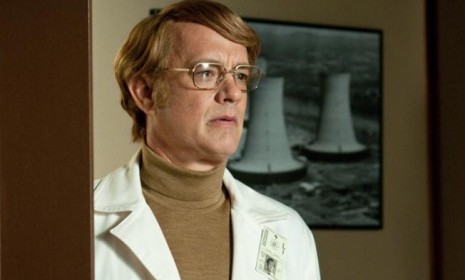Cloud Atlas: 6 fascinating behind-the-scenes facts
How did filmmakers turn David Mitchell's "unadaptable" 2004 novel into the year's most ambitious, polarizing film?

A free daily email with the biggest news stories of the day – and the best features from TheWeek.com
You are now subscribed
Your newsletter sign-up was successful
Whether you love or hate Cloud Atlas — and film critics are strongly divided — it is unquestionably one of this year's most complex and ambitious releases. Adapted from a 2004 novel by David Mitchell, Cloud Atlas stars a massive ensemble cast that includes Tom Hanks and Halle Berry, and encompasses six different storylines that unfold across centuries of human existence. (Watch the trailer below.) How did filmmakers Andy Wachowski, Lana Wachowski, and Tom Tykwer create the polarizing film? Here, six fascinating behind-the-scenes facts:
1. Cloud Atlas' journey to the big screen began with Natalie Portman
On the set of 2005's V for Vendetta, Lana Wachowski noticed that star Natalie Portman was engrossed in Mitchell's novel, says The New Yorker. Based on Portman's raves, Lana began reading it too, becoming so obsessed that she and brother/filmmaking partner Andy Wachowski decided to adapt what has often been described as a "unadaptable novel."
The Week
Escape your echo chamber. Get the facts behind the news, plus analysis from multiple perspectives.

Sign up for The Week's Free Newsletters
From our morning news briefing to a weekly Good News Newsletter, get the best of The Week delivered directly to your inbox.
From our morning news briefing to a weekly Good News Newsletter, get the best of The Week delivered directly to your inbox.
2. It took an extended working vacation to get the script into shape
In 2009, the Wachowskis hunkered down with co-director Tom Tykwer in a rented house in Costa Rica to discuss how to morph the novel's six unwieldy storylines into a coherent film. To imagine Cloud Atlas visually, they created "a Zen garden of index cards": Hundreds of scenes from the book were copied onto color-coded index cards which could be arranged and rearranged at will. As the filmmakers played with the story's structure, the script began to take shape.
3. A conversation about Herman Melville's Moby Dick convinced Hanks to star in the film
The Wachowskis and Tywker convinced a reluctant Tom Hanks to join the production by engaging him in an extended discussion about Herman Melville's Moby Dick, which Hanks was reading at the time. As the four analyzed the novel in Hanks' office, Lana Wachowski pointed to a poster for Stanley Kubrick's 2001: A Space Odyssey hanging on the wall and said, "Moby Dick and this — that's what we want to do." "I'm in," Hanks replied. "When do we start?" He was the first actor to sign onto the film.
A free daily email with the biggest news stories of the day – and the best features from TheWeek.com
4. It features an original song that needed to be "one of the greatest songs ever written"
In the book, a pivotal piece of music called the "Cloud Atlas Sextet" is composed by the fictional character Robert Frobisher who describes it as "an incomparable creation," says Grantland, combining "echoes of Scriabin's White Mass, Stravinsky's lost footprints, chromatics of the more lunar Debussy." To bring this daunting dimension of the novel to cinematic life, co-director Tom Tykwer co-composed a "Debussy-ish" song that is reinterpreted for each storyline, from a full symphonic rendition to a solemn hymn sung by a hoard of clones.
5. It draws more parallels between its storylines by reusing props
"We tried to keep some shapes and some themes going through the different stories and through the sets," Hugh Bateup, a designer on the film, tells the (New York) Daily News. Jeweled buttons coveted by Tom Hanks' character in the 1850s appear around his neck during a scene set in the 22nd century, and a design on one character's clothes in 1970s San Francisco reappears as a wallpaper design in 2144 Seoul. "Hopefully if you see the movie it won't be obvious, but you'll feel the similarities," adds Bateup.
6. The sixth and final storyline features its own unique dialect
For a segment set in the distant future, Mitchell created a devolved, pidgin form of English for his characters to speak; the directors faithfully translated it to the film. Slate offers a full phrase book: Noteworthy words include "judas" (to betray or sell out), "sivvy" (to search), and "yibber" (to gossip).
Sources: Rotten Tomatoes, The New Yorker (2) (3), Grantland, The Daily News, Slate

-
 Sepsis ‘breakthrough’: the world’s first targeted treatment?
Sepsis ‘breakthrough’: the world’s first targeted treatment?The Explainer New drug could reverse effects of sepsis, rather than trying to treat infection with antibiotics
-
 James Van Der Beek obituary: fresh-faced Dawson’s Creek star
James Van Der Beek obituary: fresh-faced Dawson’s Creek starIn The Spotlight Van Der Beek fronted one of the most successful teen dramas of the 90s – but his Dawson fame proved a double-edged sword
-
 Is Andrew’s arrest the end for the monarchy?
Is Andrew’s arrest the end for the monarchy?Today's Big Question The King has distanced the Royal Family from his disgraced brother but a ‘fit of revolutionary disgust’ could still wipe them out